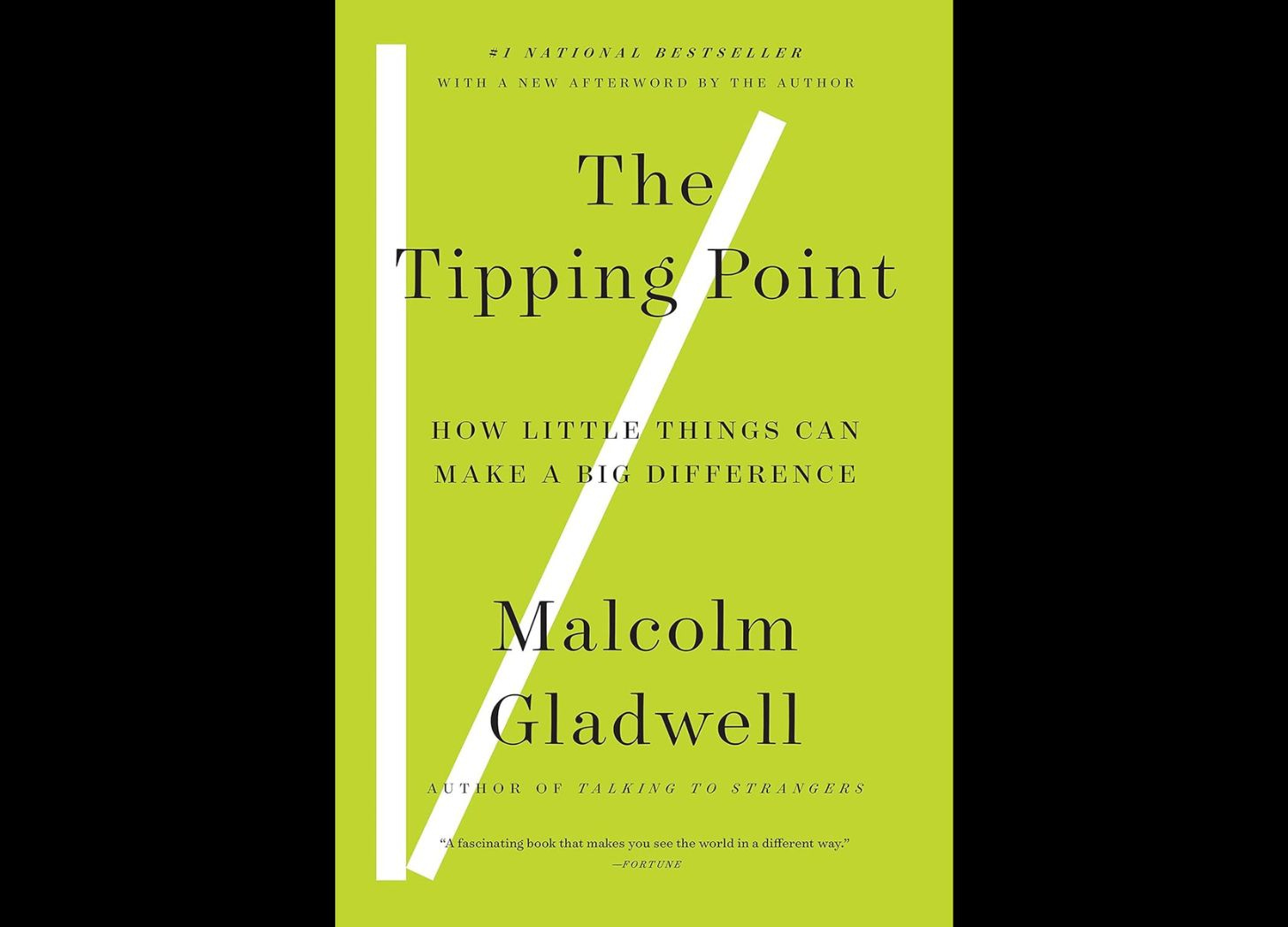Book Byte #205 "The Tipping Point" by Malcolm Gladwell
How Little Things Can Make a Big Difference
📣 Curious Quotes from the Author
“The tipping point is that magic moment when an idea, trend, or social behavior crosses a threshold, tips, and spreads like wildfire.”
“To be someone's best friend requires a minimum investment of time. More than that, though, it takes emotional energy. Caring about someone deeply is exhausting.”
“Emotion is contagious.”
“If you want to bring a fundamental change in people's belief and behavior...you need to create a community around them, where those new beliefs can be practiced and expressed and nurtured.”
“That is the paradox of the epidemic: that in order to create one contagious movement, you often have to create many small movements first.”
“There are exceptional people out there who are capable of starting epidemics. All you have to do is find them.”
“A study at the University of Utah found that if you ask someone why he is friendly with someone else, he’ll say it is because he and his friend share similar attitudes. But if you actually quiz the two of them on their attitudes, you’ll find out that what they actually share is similar activities. We’re friends with the people we do things with, as much as we are with the people we resemble. We don’t seek out friends, in other words. We associate with the people who occupy the same small, physical spaces that we do.”
“Economists often talk about the 80/20 Principle, which is the idea that in any situation roughly 80 percent of the “work” will be done by 20 percent of the participants. In most societies, 20 percent of criminals commit 80 percent of crimes. Twenty percent of motorists cause 80 percent of all accidents. Twenty percent of beer drinkers drink 80 percent of all beer. When it comes to epidemics, though, this disproportionality becomes even more extreme: a tiny percentage of people do the majority of the work.”
“A book, I was taught long ago in English class, is a living and breathing document that grows richer with each new reading.”
“There is a simple way to package information that, under the right circumstances, can make it irresistible. All you have to do is find it.”
“A critic looking at these tightly focused, targeted interventions might dismiss them as Band-Aid solutions. But that phrase should not be considered a term of disparagement. The Band-Aid is an inexpensive, convenient, and remarkably versatile solution to an astonishing array of problems. In their history, Band-Aids have probably allowed millions of people to keep working or playing tennis or cooking or walking when they would otherwise have had to stop. The Band-Aid solution is actually the best kind of solution because it involves solving a problem with the minimum amount of effort and time and cost.”
“Look at the world around you. It may seem like an immovable, implacable place. It is not. With the slightest push—in just the right place—it can be tipped.”
“Acquaintances, in sort, represent a source of social power, and the more acquaintances you have the more powerful you are.”
“When two people talk, they don’t just fall into physical and aural harmony. They also engage in what is called motor mimicry. If you show people pictures of a smiling face or a frowning face, they’ll smile or frown back, although perhaps only in muscular changes so fleeting that they can only be captured with electronic sensors. If I hit my thumb with a hammer, most people watching will grimace: they’ll mimic my emotional state. This is what is meant, in the technical sense, by empathy. We imitate each other’s emotions as a way of expressing support and caring and, even more basically, as a way of communicating with each other.”
📚 Cognition of the Book’s Big Idea
Epidemics are triggered by a number of important variables. They are simple to identify and can be purposefully employed to propagate concepts, goods, or habits. The inquiries that this book addressed were: What role does the Tipping Point play and why do ideas spread like diseases? Thoughts proliferate like infectious diseases. Once the Tipping Point threshold is crossed, the situation becomes epidemic. Which types of individuals have the most impact on the dissemination of ideas?
Epidemics are generally caused by a select group of important individuals. When it comes to "Connectors," or those with a large social network, ideas propagate especially quickly. Some people have an innate ability to persuade others and sell concepts. There are "Mavens" in every network who gather data and disseminate it to others. What additional elements influence the dissemination of ideas? Before an idea can proliferate, it must first stick. Our behavior is influenced by external conditions far more than we realize. An epidemic's potential to spread can be determined by even the tiniest contextual modifications.
🤝Collaborative Insight for Techies
Everything we do can be explained in Nature. Ideas spread and have throughout the centuries of Human Civilization. It’s what brought our current levels of technology and politics to bear.
Everyone has ideas worth listening to, however, most of us choose to tell them to wrong type of people, usually centered with the people around us locally. This can be very bad if you don’t share the same values as them. They’ll default to hating your ideas and you will think they are right when actually it just didn’t get presented to the right audience.
Share your dreams with the people who are most likely to not crush them.
My Software Stack: I use Skool for my Online Community Platform and ClickFunnels for my Landing Pages, Payments, and Email Sequencing. I use Substack for my Newsletter and Taskade for AI Note Taking/Second Brain/Project Management. I use my Personal Amazon Store for Tech and Book Recommendations.
Try out the "Think and Grow Rich Challenge" by Russell Brunson and Learn more about the First Self Help Author Napoleon Hill

